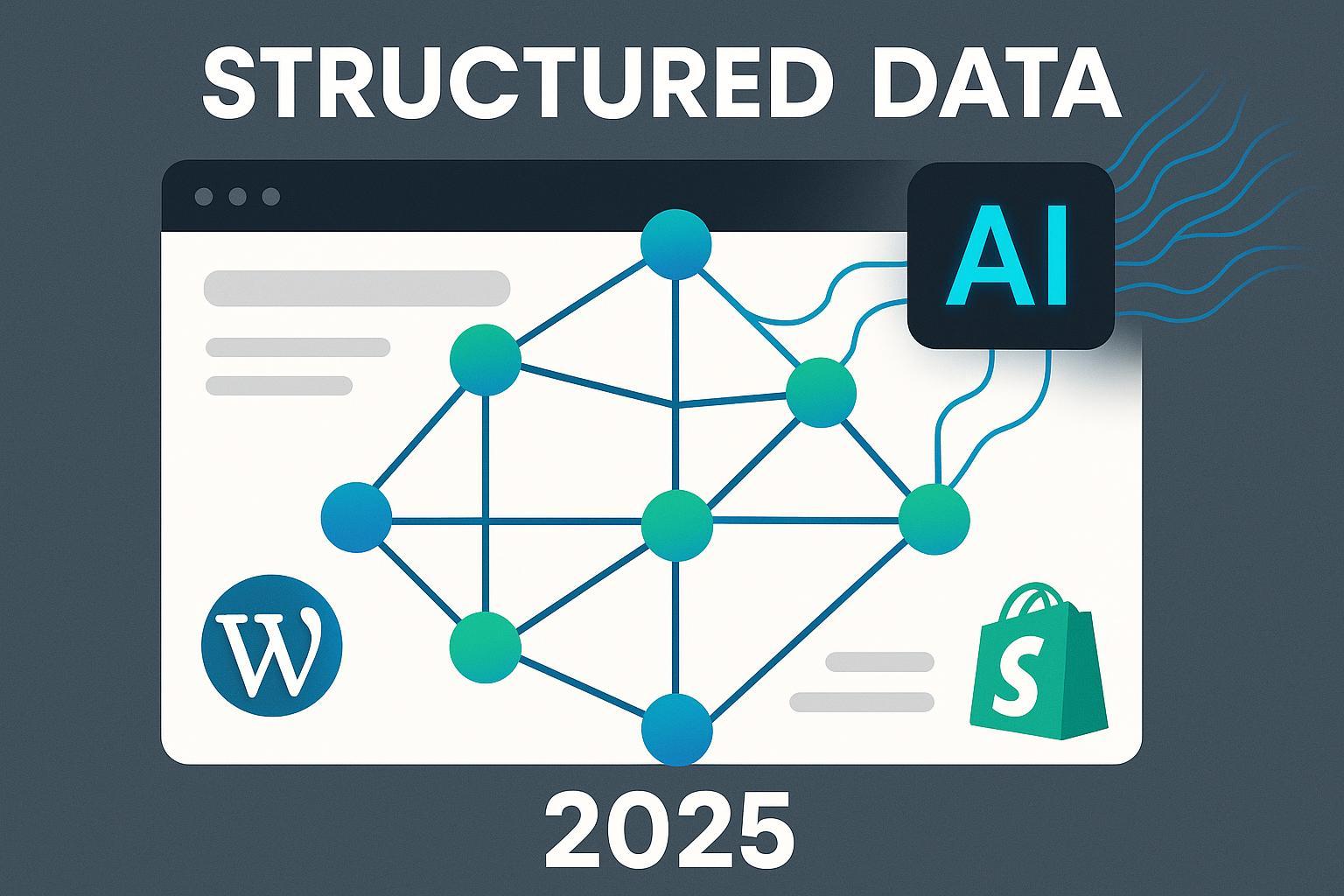Best AI SEO Tools for Schema Markup (2025): Smarter Picks for WordPress, Shopify, and Enterprise

Updated: 2025-08-28
If you want richer results and clearer entity signals this year, AI-driven schema isn’t optional—it’s the backbone of how search engines and LLMs understand your site. Google also simplified which structured data types power visible enhancements in 2025, so precision matters more than volume. See Google’s June 2025 note in the Simplifying Search results announcement (Google Search Blog, 2025) and always validate with the Rich Results Test (Google).
This guide curates tools that use real AI or meaningful automation to generate, manage, and monitor Schema.org markup—plus a workflow you can actually deploy.
How we picked (and how to choose fast)
We only included tools that demonstrate AI/ML or robust automation for schema generation/optimization, with active updates in 2024–2025. We scored:
- AI capability: entity extraction, automated schema, knowledge graphs, AI suggestions/fixes.
- Coverage and control: supported types, custom templates, RDF/knowledge-graph support.
- Integrations: WordPress, Shopify, APIs, and ecommerce modules.
- Validation & QA: testing, alerts, Search Console integrations.
- Safety: avoids duplicate/contradictory markup; follows Google’s structured data guidelines per the structured data overview (Google, 2025).
Quick tool-picker
- WordPress bloggers/SMBs wanting plug-and-play: Rank Math, Yoast SEO, SEOPress.
- Content-heavy sites aiming for entity/knowledge graph depth: WordLift or InLinks.
- Enterprise governance, templates at scale, API-first: Schema App.
- Agencies needing an AI assistant across tasks, including schema: SearchAtlas (OTTO AI).
- Already drafting in QuickCreator? Use it for entity/topic planning, then hand off to a schema tool via WordPress.
The best AI schema tools in 2025
1) WordLift — AI knowledge graphs and schema for content and ecommerce
Best for: Teams who want a site-level knowledge graph with automated entity enrichment and schema.
- Standout AI/automation
- Uses AI/NLP to identify entities, enrich content, and add schema as part of building a Knowledge Graph, then leverages it for internal linking and context signals, per the Agent WordLift docs (WordLift, 2025).
- Offers an AI-driven internal linking workflow tied to entities, detailed in the internal linking workflow guide (WordLift Docs, 2025).
- Key integrations
- WordPress plugin connects your site to WordLift’s AI agent. WooCommerce support includes a Product Knowledge Graph builder that can align with Merchant Center, outlined in the Product Knowledge Graph overview (WordLift, 2025).
- API direction: WordLift is previewing an MCP Server to expose product knowledge graphs and AI workflows for custom builds, as shared in AI agents and the Model Context Protocol (WordLift blog, 2025).
- Pricing
- 14‑day trial available; enterprise/quote-based packages. See the WordLift site (2025).
- Watch-outs
- Validate markup post-deployment with Google’s tools; ensure your theme or other plugins aren’t outputting duplicate schema.
2) InLinks — Entity-first internal linking with automatic WebPage schema
Best for: Semantic SEO strategists who want entity alignment, internal link automation, and contextual schema.
- Standout AI/automation
- Builds an entity-based knowledge graph for your site and automatically generates WebPage schema after you associate topics, as described in Entity SEO targeting (InLinks, 2025).
- AI/NLP-driven internal linking and content audits benchmark pages against Google’s Knowledge Graph and SERPs; see the internal linking audit tools page (InLinks, 2025) and content gap analysis (InLinks, 2025).
- Integrations/workflow
- JavaScript injection lets marketers deploy internal linking/schema changes quickly; admin UI manages entities and anchoring.
- Pricing
- Starts around $49/month for 100 pages and uses a credit model for crawling/audits per How pricing works (InLinks, 2025).
- Watch-outs
- Official docs confirm automatic WebPage schema; other types (FAQ/HowTo/etc.) should be validated and may require complementary tools.
3) Schema App — Enterprise dynamic schema and content knowledge graph
Best for: Enterprises that need robust templates, ongoing updates as content changes, and a connected knowledge graph.
- Standout AI/automation
- Dynamic schema markup: map page elements to schema properties so markup updates automatically with content; see the dynamic schema solution overview (Schema App, 2025).
- Content Knowledge Graph supports linking entities and can be leveraged with LLMs, per how to leverage your content knowledge graph for LLMs (Schema App, 2025).
- Integrations
- WordPress plugin for baseline coverage and enterprise CMS integrations (e.g., Sitecore) with APIs, outlined in implement schema on Sitecore (Schema App, 2025).
- Measurement
- Schema Performance Analytics ties to GSC to track rich results impact; guidance and multilingual best practices are in multilingual schema implementation (Schema App, 2025).
- Pricing
- Enterprise, contact sales. Free WP plugin available; see the WordPress plugin page (Schema App, 2025).
- Watch-outs
- Requires upfront modeling/governance. Align templates with Google’s currently supported types and retire deprecated rich result types per Google’s June 2025 simplification update.
4) Rank Math — WordPress schema generator with Content AI assist
Best for: WordPress sites (blogs and WooCommerce) that want flexible, template-driven schema with AI guidance.
- Standout AI/automation
- 20+ predefined schema types, custom schema templates (Pro), and Content AI workflows for product/content optimization as summarized in Rank Math’s SEO automation overview (2025).
- Integrations
- Deep WordPress + WooCommerce modules, Local SEO module, and canonical handling to reduce duplication per the WooCommerce duplicate content guide (Rank Math KB, 2025).
- Validation/QA
- Built-in Schema Markup Validator and guidance to use Google’s test; see the Schema Markup Validator article (Rank Math KB, 2025).
- Pricing
- Free core plugin; paid tiers add advanced schema templates and Content AI features. Details on the Rank Math site (2025).
- Watch-outs
- Avoid duplicate schema from themes or other plugins; known conflicts appear in Rank Math’s support tickets (e.g., duplicate schema ticket (2025)).
5) Yoast SEO — Automated schema graph + AI Optimize
Best for: WordPress users who want reliable, automatic schema plus AI-assisted on-page guidance.
- Standout AI/automation
- Automatically generates a schema graph for posts, pages, and more; Premium adds AI Optimize for titles/meta and real-time guidance. The August 2025 update expanded AI Optimize to the Classic Editor and refined the Redirect Manager, per Yoast SEO release notes (Yoast, Aug 2025).
- Integrations
- Works with Elementor, WooCommerce, Semrush, and more; Google Docs add-on enables real-time checks during drafting, as described on the Yoast AI tools page (2025).
- Validation/QA
- Continuous updates and changelogs document schema and AI improvements; see the Yoast SEO changelog (Developer, 2025).
- Pricing
- Free and Premium tiers; AI features included in Premium per Yoast’s press announcement on AI features (2025).
- Watch-outs
- If you switch from another SEO plugin, ensure you migrate schema settings and avoid running two schema generators at once.
6) SEOPress — Budget-friendly schema automation with new AI for metadata
Best for: SMBs and agencies wanting flexible schema automation rules and cost-effective licensing.
- Standout AI/automation
- PRO supports automatic schema via targeting rules, field mapping, and per‑post JSON‑LD control. Version 9.0 (July 2025) added DeepSeek AI for generating titles/meta, per the SEOPress 9.0 release (2025).
- Integrations
- Works across WordPress, WooCommerce, and local SEO use cases; performance improvements for sitemaps and media noted in recent releases; see features overview (SEOPress, 2025).
- Pricing
- As of Aug 1, 2025: Free; PRO 1 site $49/yr, 5 sites $59/yr, Unlimited $149/yr according to the new plans announcement (SEOPress, 2025) and pricing page (SEOPress, 2025).
- Watch-outs
- AI features focus on metadata creation; schema generation is rule-based automation rather than generative AI—still powerful for consistency.
7) SearchAtlas (LinkGraph) + OTTO AI — AI assistant that can manage schema in broader SEO workflows
Best for: Agencies or teams that want an AI assistant (OTTO) to coordinate schema alongside content and technical tasks.
- Standout AI/automation
- Includes a Schema Markup tool for 30+ types and AI-driven suggestions; OTTO AI acts as an autonomous assistant across SEO tasks including schema, as described in the AI SEO guide featuring OTTO (SearchAtlas, 2025).
- Integrations and QA
- Real-time validation guidance and troubleshooting suggests confirming deployment in page source, using Google’s Rich Results Test, and clearing caches; see how to troubleshoot missing schema markup (Help Center, 2025).
- Pricing
- Platform pricing isn’t public; contact sales. Some components (e.g., local citations) are sold as discrete products, per the local SEO tools page (SearchAtlas, 2025).
- Watch-outs
- Confirm how schema gets deployed (plugin, GTM, or CMS integration) in your stack; validate that it doesn’t conflict with theme-generated markup.
Implementation playbook: safer AI schema in 7 steps
- Choose a single source of schema truth
- Avoid duplicate or contradictory markup. If your theme outputs schema, disable it when using a plugin. Rank Math documents how duplication can arise in ecommerce setups; see WooCommerce duplicate content issues (Rank Math KB, 2025).
- Align entities before you generate schema
- Define the primary entity for each page (person, product, organization, article). Tools like WordLift and InLinks help anchor entity relationships. If you draft in QuickCreator, use its real-time SERP/topic suggestions to plan entities and headings, then hand off to your chosen schema tool.
- Generate and attach the right type
- Only add structured data that’s reflected on the visible page. Check Google’s eligibility and required properties in the structured data overview (Google, 2025). Remember that Google dropped some rich result types in 2025 per the Simplifying Search results update (Google, 2025).
- Validate before publishing
- Use the Rich Results Test (Google) for the exact URL or code snippet. Fix all required fields and obvious warnings.
- Publish and monitor with Search Console
- Track errors and enhancements via Google Search Console (About page, 2025). Annotate schema releases to correlate with impressions/CTR changes.
- Recheck after template or app changes
- Any theme, app, or plugin update can affect your markup. Re-run validation on key templates, especially on Shopify/WooCommerce product pages.
- Measure impact beyond rich results
- Tie your schema work to entity coverage and internal linking. WordLift’s knowledge graph and InLinks’ internal link audits can signal better context alignment over time.
QuickCreator in your content + schema workflow
QuickCreator is an AI blogging platform with automatic SEO optimization based on SERP analysis, multilingual output, free hosting, and one‑click WordPress publishing. Use it to accelerate the front half of your pipeline:
- Plan entities and intent: Draft briefs with QuickCreator’s real-time SERP/topics to define the primary entity and supporting sections.
- Generate content fast: Produce high‑quality English or multilingual articles ready for schema.
- Handoff cleanly: Publish to WordPress in one click, then attach schema via Rank Math, Yoast, SEOPress, or enrich with WordLift/InLinks.
- Validate and iterate: Run the Rich Results Test, monitor in Search Console, and keep improving.
Try QuickCreator to speed up content and entity planning: https://quickcreator.io
FAQs
-
Do I need both a plugin and manual schema?
- Most WordPress sites can rely on a plugin (Rank Math, Yoast, SEOPress) with custom templates. Use manual JSON‑LD for edge cases or advanced types. Always validate with Google’s Rich Results Test.
-
How do I avoid duplicate markup?
- Choose one generator and disable others (including theme output). Rank Math notes how duplication happens in ecommerce setups; see the WooCommerce duplicate content guide (2025).
-
Which schema types matter most in 2025?
- For most sites: Article/BlogPosting, Product (with Offers/Reviews where policy-compliant), Organization/LocalBusiness, Event (if applicable), BreadcrumbList, FAQPage/HowTo when the content actually displays it. Check Google’s current eligibility in the structured data overview (2025) and note deprecated visuals from the June 2025 update.
-
How do I measure impact?
- Use Search Console to compare impressions, clicks, CTR before/after rollout. For richer insight, connect schema/entity work to internal linking and topic authority (e.g., via WordLift’s knowledge graph reporting or InLinks’ audits).
Meta title: Best AI SEO Tools for Schema Markup (2025): Top WordPress, Shopify, Enterprise Picks
Meta description: See 2025’s best AI schema tools—WordLift, InLinks, Schema App, Rank Math, Yoast, SEOPress, and SearchAtlas. Get use-case matches, pricing notes, and a safe implementation playbook.

